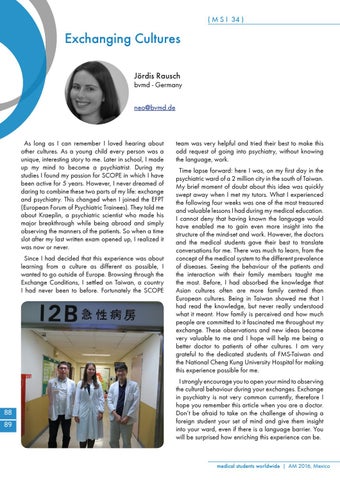( M S I 34 )
Exchanging Cultures JĂśrdis Rausch
bvmd - Germany neo@bvmd.de
As long as I can remember I loved hearing about other cultures. As a young child every person was a unique, interesting story to me. Later in school, I made up my mind to become a psychiatrist. During my studies I found my passion for SCOPE in which I have been active for 5 years. However, I never dreamed of daring to combine these two parts of my life: exchange and psychiatry. This changed when I joined the EFPT (European Forum of Psychiatric Trainees). They told me about Kraeplin, a psychiatric scientist who made his major breakthrough while being abroad and simply observing the manners of the patients. So when a time slot after my last written exam opened up, I realized it was now or never. Since I had decided that this experience was about learning from a culture as different as possible, I wanted to go outside of Europe. Browsing through the Exchange Conditions, I settled on Taiwan, a country I had never been to before. Fortunately the SCOPE
88 89
team was very helpful and tried their best to make this odd request of going into psychiatry, without knowing the language, work. Time lapse forward: here I was, on my first day in the psychiatric ward of a 2 million city in the south of Taiwan. My brief moment of doubt about this idea was quickly swept away when I met my tutors. What I experienced the following four weeks was one of the most treasured and valuable lessons I had during my medical education. I cannot deny that having known the language would have enabled me to gain even more insight into the structure of the mind-set and work. However, the doctors and the medical students gave their best to translate conversations for me. There was much to learn, from the concept of the medical system to the different prevalence of diseases. Seeing the behaviour of the patients and the interaction with their family members taught me the most. Before, I had absorbed the knowledge that Asian cultures often are more family centred than European cultures. Being in Taiwan showed me that I had read the knowledge, but never really understood what it meant. How family is perceived and how much people are committed to it fascinated me throughout my exchange. These observations and new ideas became very valuable to me and I hope will help me being a better doctor to patients of other cultures. I am very grateful to the dedicated students of FMS-Taiwan and the National Cheng Kung University Hospital for making this experience possible for me. I strongly encourage you to open your mind to observing the cultural behaviour during your exchanges. Exchange in psychiatry is not very common currently, therefore I hope you remember this article when you are a doctor. Don’t be afraid to take on the challenge of showing a foreign student your set of mind and give them insight into your ward, even if there is a language barrier. You will be surprised how enriching this experience can be.
medical students worldwide | AM 2016, Mexico
